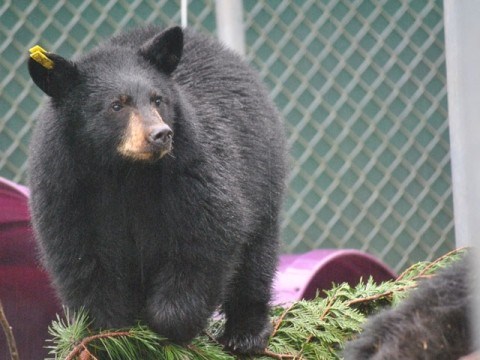Jeanie the black bear's remains have been returned to the wilds of Whistler and her cub will one day return to the wild as well.
Whistler's best known bear was destroyed by the conservation officer service on Oct. 21 after weeks of escalating human conflict that included breaking into occupied restaurants to get food. Jeanie's cub - named Jeanette after an informal poll on Jeanie's Facebook page - was sent to the Critter Care Wildlife Facility in Langley. The cub is being fed twice a day and is in a pen with five other bear cubs. Gradually feedings will be reduced to once a day, then every three days, and then every three weeks to encourage the bears to hibernate.
"She just bawled and bawled when she came here so we put her in with the other cubs a little early," said Gail Martin, executive director of the wildlife facility.
"At first she wasn't ready to mingle, but now she's sleeping and eating with them and starting to play a bit, so she should be fine."
Martin said Jeanette weighed 56 pounds when she arrived and has gained weight since then.
She has already been ear tagged for identification and will be released next summer in or near her home range in Whistler after bear hunting season - which is late enough that there should be enough natural food to sustain her.
Sylvia Dolson of the Get Bear Smart Society said that a service would be held for Jeanie in the spring, near where Jeanie's remains were placed. A memorial plaque will be placed on the rock to commemorate the bear - although she was no pet, she had been featured in books and documentaries over the years, and photographed by thousands as one of the resort's most approachable bears. When Jeanie was killed, messages came in from around the world.
She was also easy to identify, with a patch of white fur on her chest, and was often accompanied by cubs - close to 20 over the nearly two decades that people have been observing her.
Dolson has set up a memorial fund, which will be used to plant hundreds of mountain ash trees on Whistler and Blackcomb. The trees are late to produce berries, and are essential for bears fattening up for a long winter's hibernation.
The Get Bear Smart Society started the mountain ash project in 2007 and since then they've planted 374 trees - not enough to feed all of Whistler's bears. The society has ordered hundreds more plants for next year, and will need donations to pay for them and volunteers to plant them. Each planting costs roughly $10.
"We don't have a viable crop yet but hopefully in the future we can provide bears with another food source that's away from people and the village, once other berries are depleted," explained Dolson.
As well, Dolson suggested that people could donate funds to Critter Care, which is entirely funded by private donations. The average cost of feeding and caring for a captive bear cub is $5,000, and Jeanette will cost roughly $3,500 between now and her release into the wild.
Donations to the Get Bear Smart Society can be made at www.bearsmart.com and Critter Care is at www.crittercarewildlife.org.
Since 2003, Critter Care has released over 60 bears back into the wild.




